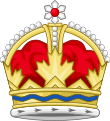Politics of New Brunswick
 |
|---|
New Brunswick has a unicameral legislature with 55 seats. Elections are held at least every five years but may be called at any time by the Lieutenant Governor (the vice-regal representative) on consultation with the Premier. The Premier is the leader of the party that holds the most seats in the legislature.
There are two dominant political parties in New Brunswick, the Liberal Party and the Progressive Conservative Party. While consistently polling approximately 10% of the electoral vote since the early 1980s, the New Democratic Party has elected few members to the Legislative Assembly. From time to time, other parties such as the Confederation of Regions Party have held seats in the legislature, but only on the strength of a strong protest vote.
The dynamics of New Brunswick politics are different from those of other provinces in Canada. The lack of a dominant urban centre in the province means that the government has to be responsive to issues affecting all areas of the province. In addition, the presence of a large francophone minority dictates that consensus politics is necessary, even when there is a majority government present. In this manner, the ebb and flow of New Brunswick provincial politics parallels the federal stage.
Since 1960, the province has elected young bilingual leaders. This combination of attributes permits the premiers of New Brunswick to be influential players on the federal stage. Former Premier Bernard Lord (Progressive Conservative) has been touted as a potential leader of the Conservative Party of Canada. Frank McKenna (premier, 1987 - 1997), had been considered to be a front-runner to succeed Prime Minister Paul Martin. Richard Hatfield (premier, 1970 -1987) played an active role in the patriation of the Canadian constitution and creation of the Canadian Charter of Rights and Freedoms. Louis Robichaud (premier, 1960 -1970) was responsible for a wide range of social reforms.
On September 18, 2006, the Liberals won a majority with 29 out of 55 seats, making 38-year old Shawn Graham the new Premier of New Brunswick.[1]
See also
References
- ^ CBC News (2006). "Liberals topple Lord's Tories in New Brunswick". Retrieved 2007-02-15.
{{cite web}}: Unknown parameter|month=ignored (help)
